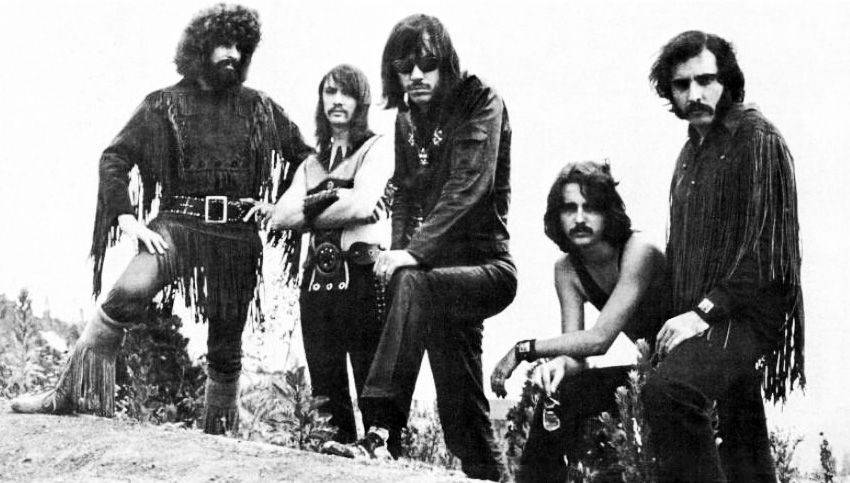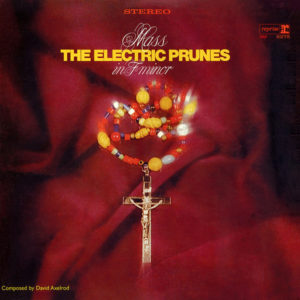Steppenwolf and the Electric Prunes Mass in F Minor: Flashback 50 to two Psychedelic classics
by John Diliberto 1/30/2018
It was 50 years ago that Steppenwolf released their debut album and The Electric Prunes released the progressive rock epic, Mass in F Minor.
One of them contains a rock classic, the other just aspired to the classic.
 I remember when I first heard Steppenwolf’s “Born to Be Wild” roar out of my parents crappy AM car radio. The family sedan suddenly became a tweaked out Harley roaring down the highway with me pushing the throttle. From the driving, and fairly novel guitar riff by Michael Monarch; that swirling, stabbing organ by Goldy McJohn (who died on August first last year); and of course, John Kay’s testosterone-laden vocal, snarling out the lyrics of Mars Bonfire, who composed the song. It’s one of my top ten all-time singles. The rest of the album, released on January 29, 1968, resided in that between-worlds zone a lot of 60s bands found themselves in. They had one foot in the psychedelic underground, another in pop. So you had what they thought might be AM radio friendly songs like “Sookie” and “Everybody’s Next one” with a few blues and rockers tossed in. But it was songs like the acid-ballad, “Desperation”, the drug-lament of “The Pusher” (written by Hoyt Axton) and the psychedelic anti-establishment screed of “The Ostrich” that drove the album to an underground classic that happened to have a Top 40 hit that is still used in movies whenever they need to pump up the energy. Check out that last one, “The Ostrich”. It’s a forgotten gem.
I remember when I first heard Steppenwolf’s “Born to Be Wild” roar out of my parents crappy AM car radio. The family sedan suddenly became a tweaked out Harley roaring down the highway with me pushing the throttle. From the driving, and fairly novel guitar riff by Michael Monarch; that swirling, stabbing organ by Goldy McJohn (who died on August first last year); and of course, John Kay’s testosterone-laden vocal, snarling out the lyrics of Mars Bonfire, who composed the song. It’s one of my top ten all-time singles. The rest of the album, released on January 29, 1968, resided in that between-worlds zone a lot of 60s bands found themselves in. They had one foot in the psychedelic underground, another in pop. So you had what they thought might be AM radio friendly songs like “Sookie” and “Everybody’s Next one” with a few blues and rockers tossed in. But it was songs like the acid-ballad, “Desperation”, the drug-lament of “The Pusher” (written by Hoyt Axton) and the psychedelic anti-establishment screed of “The Ostrich” that drove the album to an underground classic that happened to have a Top 40 hit that is still used in movies whenever they need to pump up the energy. Check out that last one, “The Ostrich”. It’s a forgotten gem.
 Another album that came out this month was The Electric Prunes’ third record, the atypical Mass in F Minor, often referred to as Electric Mass in F Minor. This is a proto-progressive rock album as the band sang the lyrics of the Catholic mass in Greek and Latin, interspersing faux gothic chants with rocked out, psychedelic interludes. The Prunes were always a curious band, almost as much of a manufactured concept as The Monkees, even though they were a gigging band when Dave Hassinger signed them to Reprise records. It’s been reported that Hassinger owned the name of the group, although that’s disputed by the band. But he did determine their direction on the Mass. The band only composed two throw-away tracks on their debut album. Nevertheless, they recorded two of my favorite singles, “I Had Too Much to Dream (Last Night)” a psychedelic anthem couched as a love song and the Bo Diddley-rhythm driven “Get Me to the World on Time.” Both were rockets to the other side, from the weed inhalations at the end of “Dream” to the oscillator scream that ended “Get Me to the World.” They were both diamonds in the old Nuggets collection. Both songs were composed by “professional” songwriters. Nancie Mantz, Annette Tucker and Jill Jones. And the band didn’t play a lot of the instruments on the track. Likewise, the Mass was written by David Axelrod, an inventive composer in his own right. The band hardly played the album, but there are some cool psychedelic rave-ups by session musicians, including, coincidentally, Richie Podolor who was an engineer on Steppenwolf’s debut. For some great insight into The Electric Prunes, get a hold of Richie Unterberger’s Urban Spacemen and Wayfaring Strangers: Overlooked Innovators and Eccentric Visionaries of ’60s Rock.
Another album that came out this month was The Electric Prunes’ third record, the atypical Mass in F Minor, often referred to as Electric Mass in F Minor. This is a proto-progressive rock album as the band sang the lyrics of the Catholic mass in Greek and Latin, interspersing faux gothic chants with rocked out, psychedelic interludes. The Prunes were always a curious band, almost as much of a manufactured concept as The Monkees, even though they were a gigging band when Dave Hassinger signed them to Reprise records. It’s been reported that Hassinger owned the name of the group, although that’s disputed by the band. But he did determine their direction on the Mass. The band only composed two throw-away tracks on their debut album. Nevertheless, they recorded two of my favorite singles, “I Had Too Much to Dream (Last Night)” a psychedelic anthem couched as a love song and the Bo Diddley-rhythm driven “Get Me to the World on Time.” Both were rockets to the other side, from the weed inhalations at the end of “Dream” to the oscillator scream that ended “Get Me to the World.” They were both diamonds in the old Nuggets collection. Both songs were composed by “professional” songwriters. Nancie Mantz, Annette Tucker and Jill Jones. And the band didn’t play a lot of the instruments on the track. Likewise, the Mass was written by David Axelrod, an inventive composer in his own right. The band hardly played the album, but there are some cool psychedelic rave-ups by session musicians, including, coincidentally, Richie Podolor who was an engineer on Steppenwolf’s debut. For some great insight into The Electric Prunes, get a hold of Richie Unterberger’s Urban Spacemen and Wayfaring Strangers: Overlooked Innovators and Eccentric Visionaries of ’60s Rock.
Both albums are too rockin’ to play on Echoes, so think of this as a bonus Flashback 50.
https://www.youtube.com/watch?v=rMbATaj7Il8
https://www.youtube.com/watch?v=IJRBeL9pfc0

Hell John…play it anyway